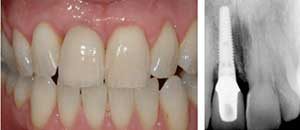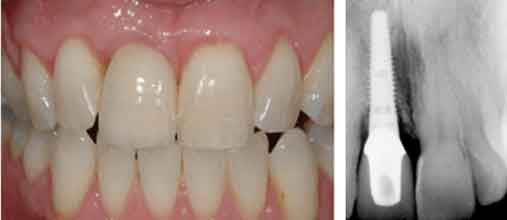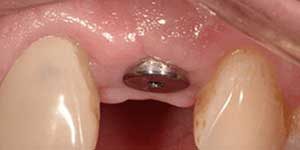Dental Implants Redondo Beach
Dental implants* are a fixed solution to missing teeth. The finished result is natural and long-lasting, and feels just like a normal tooth. While there are other procedures to replace missing teeth, dental implants can create a smile that is very natural and extremely durable. It’s almost impossible to distinguish the implant from your existing teeth.
What’s an dental implant?
An implant is a manufactured replacement for the root of a tooth. Usually made of titanium and looking a little like a screw, the implant is surgically positioned in the jaw bone. A crown is then attached to the top of the implant to fill the gap of the missing tooth.
How is an implant fitted?
A series of scans are taken by our doctor to aid in positioning the implant and to ensure you have plenty of healthy bone structure. If the bone is diseased or missing, there is still a possibility of a bone graft in order to make an implant viable.
The titanium implant is surgically placed in the bone of your jaw where a tooth once was. It is then left for between two and six months so the bone can grow around the implant. During this time you may wear a temporary crown.
Once the implant is securely fused to the bone, the temporary crown is removed and a permanent crown is either cemented or screwed into place.
If you are missing all of your teeth and wear a full denture, it is still possible to use dental implants to restore your smile. A full arch of natural-looking teeth can be held in place on as little as four implants. These fit snugly to help make it feel comfortable and eliminate the need for daily removal and cleaning.
What are the advantages of an implant?
Implants create the most natural and life-like solution to a missing tooth. The result is virtually indistinguishable from your other teeth and in a very short space of time, it will likely feel completely normal.
Other solutions for replacing missing teeth – either a bridge or dentures – are not as long-lasting or natural-looking. Implants allow you to eat, speak and maintain an oral health regimen as if you had never lost a tooth in the first place.
Am I a suitable candidate for implants?
The only requirements to have a dental implant fitted is that you are in good health, possess a healthy jawbone and have no gum disease. The success rate of dental implants is very high.
A factor that can impact on the success of the procedure is the presence of gum disease or tooth decay. These need to be fully treated before even thinking about implants. Smoking needs to be stopped well before treatment and ideally after the implants are fitted. Smoking reduces healing capacity and can cause complications at the integration point of the implant, not to mention its other effects on general health.
Some medical conditions and the medication required to treat them can also have an adverse effect on implants. These include diabetes, cancer and gastric reflux.
It’s important to fully discuss your medical history with your dentist in the planning stages of the implant procedure.
Maintaining dental implants
One of the biggest advantages of dental implants is that they require no special after-care; simply brush, floss and visit your dentist as normal. Good oral hygiene, healthy gums and a twice yearly check-up are your implant’s best friends.
How long do implants last?
With proper oral hygiene, you can expect dental implants to last around 20 years. However, it’s entirely possible for them to last a lifetime.
*Any surgical or invasive procedure carries risks. Before proceeding, you should seek a second opinion from an appropriately qualified health practitioner.
Dental implants are a permanent replacement for missing teeth. Unlike a bridge or dentures, implants are placed right into the bones of your jaw, where they form a strong, natural foundation for replacement teeth. We can use implants to replace a single tooth with an implant-supported crown, or we can use them to replace multiple teeth with implant-supported bridges and dentures.
Once an implant is placed it bonds permanently to your bone tissue, and although the crowns or dentures may need to be replaced periodically, the implant itself can last a lifetime.
Implants are surgically placed in your jaw in a two-phase process. First, we prepare your jaw and place the implant. This may involve augmentation of your existing bone tissue to strengthen the foundation for the implant. The implant itself is surgically placed in your jaw and left to heal. Once the implant is healed we place a device called an abutment on the implant and attach the crown or denture.
Once the crown is placed you care for the implant as you would any tooth by brushing and flossing regularly.
An implant is an artificial root which is screwed into the jaw bone. For example, you are a basis for a crown, bridge or denture. The implant also has support for overdentures or click teeth. This “artificial root” his missing teeth replaced in an aesthetically pleasing manner. An implant can be inserted to one, several or even all teeth replaced. Implants are made of titanium, a material that tolerates the body generally good
The Dental treatment
An implant is inserted under local anesthesia. After the anesthetic has been inserted, the dentist makes the gums loose at the point where the implant should come. He drills a hole in the jawbone where the implant is placed. He then attaches the gums. When placing multiple implants, he repeats these operations. Then he places the crown, bridge or overdenture. Most people have little trouble handling. Against any post-operative pain treatment or tender gums, you can take an ordinary painkiller. the implant is firmly anchored in the bone after three to six months.
Depending on the difficulty level, the treatment is done in phases:
Information and extensive research;
Making a treatment plan with budget;
Discussing the final treatment;
Perform any necessary treatments;
Execute the definitive treatment plan: applying the implants, superstructures, crowns, bridges and dentures;
Monitoring and aftercare in the short and long term.
After surgery
After a surgical procedure there is always a certain degree of post-operative pain. The anesthesia wears off after 2 to 4 hours. If necessary, use the prescribed painkillers. After 1-2 weeks, the stitches are removed, unless absorbing sutures are used.
After 12-24 weeks, it is checked whether the implants have grown.
Hereafter arrangements are made to make the final provision.
Are there any complications?
An implant treatment is usually carried out successfully, but sometimes there are complications:
Any bleeding, swelling, mild degree of fever, pain, bruising and limited mouth opening. These symptoms usually disappear within a few days.
Complications may arise, such as inflammation of the bone and gums, and / or emotional disorders lip or chin to implant in the mandible, nerve injury and numbness.
It is necessary to provide for a good oral hygiene in connection with the preservation of the implant. If oral hygiene is insufficient it can lead to mucositis (inflamed gums) or periimplantitist (bone resorption around the implant) arise.
Smoking and periodontal treatments in the past, a major risk for the healing of the wound around the implant and increase the risk of gum inflammation and bone loss around the implant.
If you are diabetic it is even more important to maintain a good dental cleaning.
If you are taking blood thinners and stands the risk of bleeding is present under the treatment of thrombosis. Please be sure to contact your therapist!
There is a risk that the implant should not be securely growing and removed.
Rare complications during or after the treatment:
The emergence of a small opening of the oral cavity to the sinus (possibly in upper jaw);
Damage to a nerve as a result of the anesthesia or of pulling itself (as possible to pulling teeth in mandible);
Inflamed hematoma or abscess.
Delayed wound healing.
Inflammation of the part of the bone where the root sat
Frequently Asked Questions
When is an implant treatment possible?
An implant can be inserted to one, several or even all teeth replaced. The condition is that your jaw is fully grown. This means that the implants can be inserted in people over about 18 years. There must be enough healthy bone to anchor the implant well. The gums should be healthy. The dentist will assess on the basis of X-rays that you have enough jaw bone, and whether it is healthy. Nowadays it is possible to make new bone occur in places where there is too little of.
Dental Implant Cost
Many people are afraid of dental implants not because it is a painful or tedious procedure but there is a very common perception that dental implants cost a lot more than other types of artificial tooth replacement.
What most people should try to understand is that in the long run, dental implants are much more affordable and cost efficient.
Why? Simple!
Once you have your dental implant procedures completed, all you need to do is to follow the proper steps to take care of it and it will last throughout your lifetime.
On the other hand, other artificial prosthetics have to be constantly replaced and repaired. If you factor longevity into the equation, dental implants certainly triumph over these other alternatives and will eventually cost about the same.
Plus, you can’t possibly put a price on the numerous intangible benefits such as convenience, practicality, peace of mind, and sense of security that you get from having dental implants!


Dental Insurance Carriers

Telephone No.(310) 376 4537




